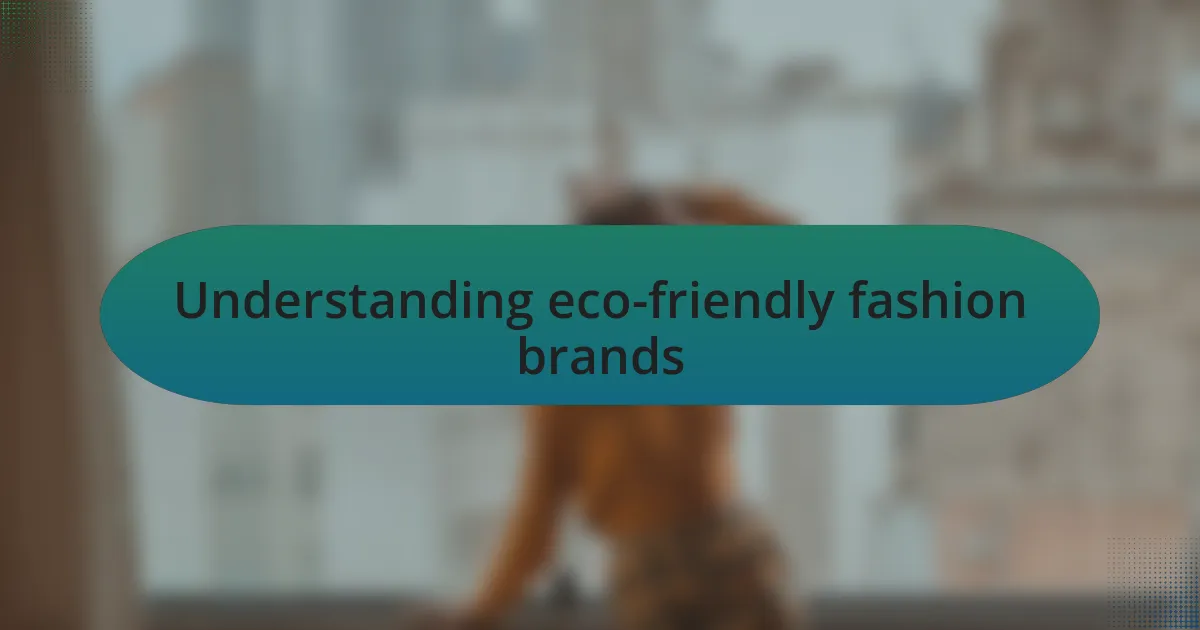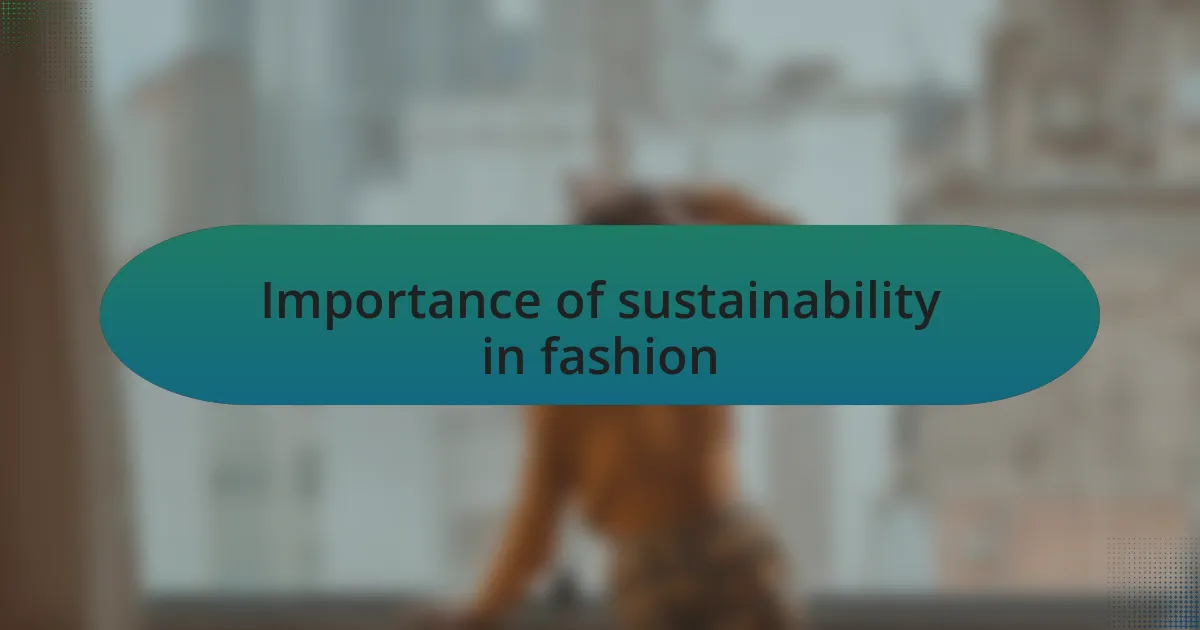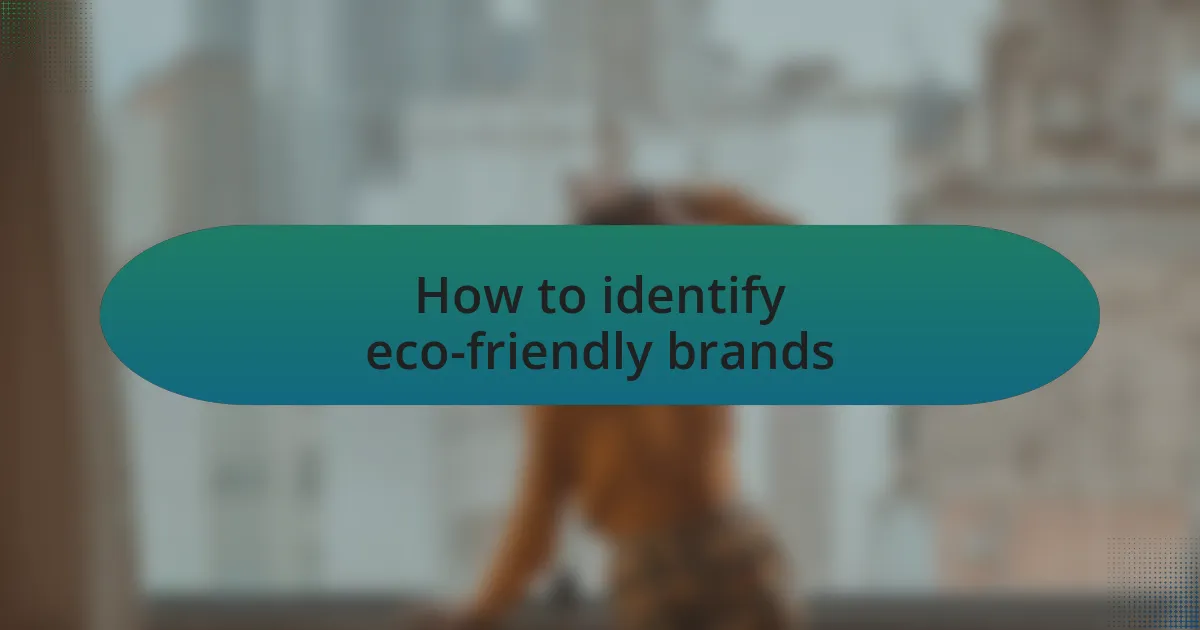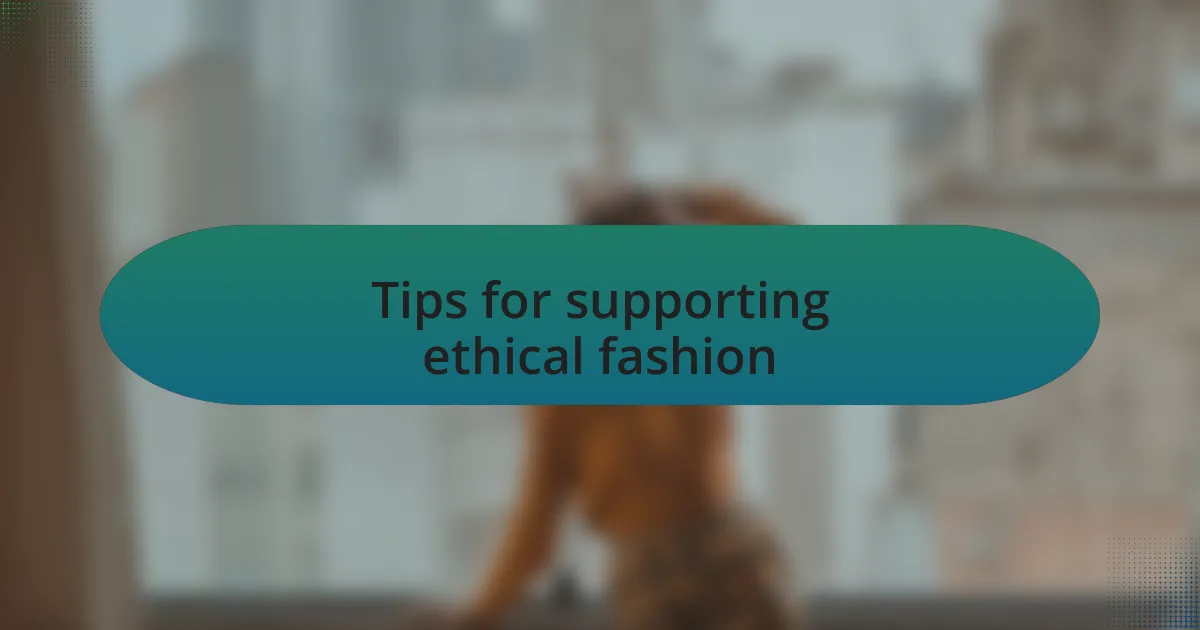Key takeaways:
- Eco-friendly fashion brands prioritize sustainability, utilizing organic materials and ethical practices while promoting transparency in their production processes.
- Sustainability is essential in fashion to reduce environmental impact, encouraging consumers to invest in long-lasting pieces and support brands aligned with their values.
- Identifying eco-friendly brands involves checking for transparency, certifications, and engaging with their narratives to understand their commitment to sustainability.
- Personal experiences and conversations with designers can deepen the connection to brands, fostering a community focused on ethical consumption and sustainability.

Understanding eco-friendly fashion brands
Understanding eco-friendly fashion brands involves recognizing their commitment to sustainability and ethical practices. When I first stumbled upon brands that prioritize eco-friendly materials, it felt like a revelation. I mean, how refreshing is it to find fashion that doesn’t cost the earth?
Often, these brands utilize organic fabrics, recycled materials, and low-impact dyes, which drew me in. I remember trying on a dress made from organic cotton; it was not just soft to wear but also came with a story of sustainability. Isn’t it incredible how our fashion choices can support a healthier planet?
Moreover, eco-friendly brands tend to be transparent about their production processes. When I learned that many of them ensure fair labor practices, it struck a chord with me. It made me wonder: how often do we stop to consider who made our clothes? The emotional connection formed through conscious shopping is something I cherish deeply.

Importance of sustainability in fashion
The fashion industry plays a significant role in contributing to environmental degradation. I remember a time when I learned just how much water is wasted in the production of a single cotton t-shirt, and it left me pondering about the sheer volume of resources we often take for granted. Isn’t it astonishing that a single garment can have such a profound impact on our world?
Sustainability in fashion isn’t just a trend; it’s a necessary shift. One cold evening, while sifting through my wardrobe, I made a conscious decision to donate clothes that I no longer wore. This act sparked a realization: what if I invested more in sustainable pieces that would last longer? It made me see fashion as a form of storytelling around the experiences we share with our clothes, rather than just fleeting trends.
Ultimately, ethical fashion choices encourage us to think about who is affected by our consumption patterns. After discovering brands that donate a portion of their profits to environmental causes, I felt empowered to support businesses that align with my values. It’s fascinating how our purchasing power can not only elevate our personal style but also contribute to a greater cause.

How to identify eco-friendly brands
Identifying eco-friendly brands requires a keen eye for transparency. I vividly recall a time when I stumbled upon a clothing label that proudly displayed its sourcing and manufacturing practices. It felt reassuring to see them openly share details about their eco-friendly materials and fair labor conditions. Isn’t it refreshing when brands choose honesty over greenwashing?
Another way to spot sustainable brands is by checking their certifications. For instance, certifications like GOTS (Global Organic Textile Standard) or Fair Trade can signify that a company is truly committed to sustainable practices. I once overlooked this detail until a friend pointed it out, and it changed my shopping habits forever. Now, I find assurance in knowing that brands with recognized certifications have been vetted for their ethical claims.
Lastly, engaging with a brand’s narrative can reveal its commitment to the planet. I’ve found that brands often share stories about their values and initiatives on their websites or social media. When I read about a brand’s initiative to reduce waste through recycling programs or its support for local artisans, I can’t help but feel connected. Doesn’t it make you more likely to support a brand when you resonate with its mission?

My journey in discovering brands
As I embarked on my journey to discover eco-friendly brands, it often felt like piecing together a puzzle. One day, while exploring a small boutique, I came across a vibrant scarf made from recycled materials. The moment I touched it, I knew I had stumbled onto something special. It was as if the fabric whispered stories of sustainability, and I felt a surge of excitement. Have you ever had an item speak to you like that?
I also remember a memorable conversation with a local designer at a market. They shared their experience of sourcing materials from sustainable suppliers, emphasizing the importance of ethical practices. Hearing their passion firsthand was incredibly inspiring and made me rethink the way I viewed fashion. It truly struck me how much deeper the connection with a brand can be when the people behind it live and breathe their values. Isn’t it fascinating to learn about the purpose behind a product?
Over time, I developed a habit of seeking out the stories behind brands. My curiosity often led me down rabbit holes of research, uncovering hidden gems that aligned with my values. Each discovery felt like an invitation to join a community of like-minded individuals who prioritize sustainability. Who wouldn’t feel empowered knowing that their choices contribute to a better world?

Tips for supporting ethical fashion
When it comes to supporting ethical fashion, one of the simplest actions you can take is to educate yourself about the brands you choose to support. I started by reading brand missions and materials used in their products. Each story I uncovered revealed not just a piece of clothing, but also the values that shaped it. Isn’t it amazing how much we can learn just by asking a few questions about where our clothes come from?
Another impactful tip is to invest in quality over quantity. I recall a time when I bought a beautifully crafted, timeless dress instead of several fast-fashion items. That dress has become a staple in my wardrobe, and every time I wear it, I feel not only stylish but also proud, knowing I made a conscious choice. Have you ever experienced the satisfaction that comes from carefully curating your wardrobe with pieces you genuinely love?
Finally, spreading awareness about sustainable brands within your circle can foster a culture of ethical consumption. I often discuss my excitement for eco-friendly labels with friends, sharing stories about their practices and the importance of making thoughtful purchases. Isn’t it fulfilling to influence others and create a ripple effect of positive change? It’s more than just fashion; it’s a movement towards a more conscious lifestyle.

Personal favorites and recommendations
One of my all-time favorite eco-friendly brands is Reformation. I remember the first time I slipped into one of their dresses; it felt like I was wearing a piece of art. Their commitment to sustainability and transparency struck a chord with me. What’s not to love about a brand that offers gorgeous styles while actively working to reduce its carbon footprint?
Another gem I’ve found is Pact, which focuses on organic cotton basics. There was a point when I realized my wardrobe was lacking in comfortable yet eco-conscious essentials. After trying their products, I felt an instant boost knowing I was supporting fair trade practices. Have you ever experienced that “aha” moment when you find a brand that aligns perfectly with your values?
Lastly, I can’t rave enough about Eileen Fisher’s initiatives towards circular fashion. I once participated in their take-back program, returning old pieces for recycling and receiving a discount on new ones. The satisfaction of knowing that my old clothes wouldn’t end up in a landfill left me with a sense of accomplishment. Isn’t it incredible to think that our choices can pave the way for a more sustainable future?